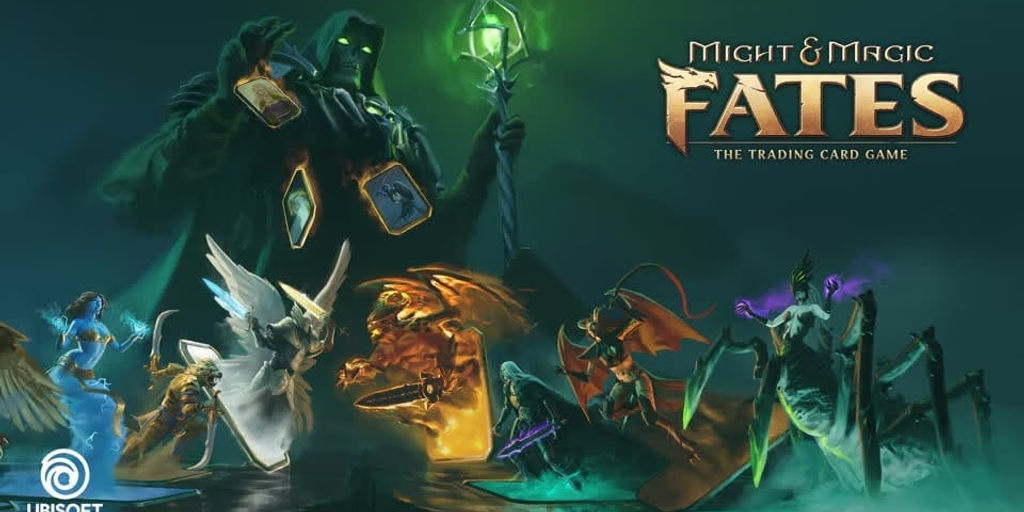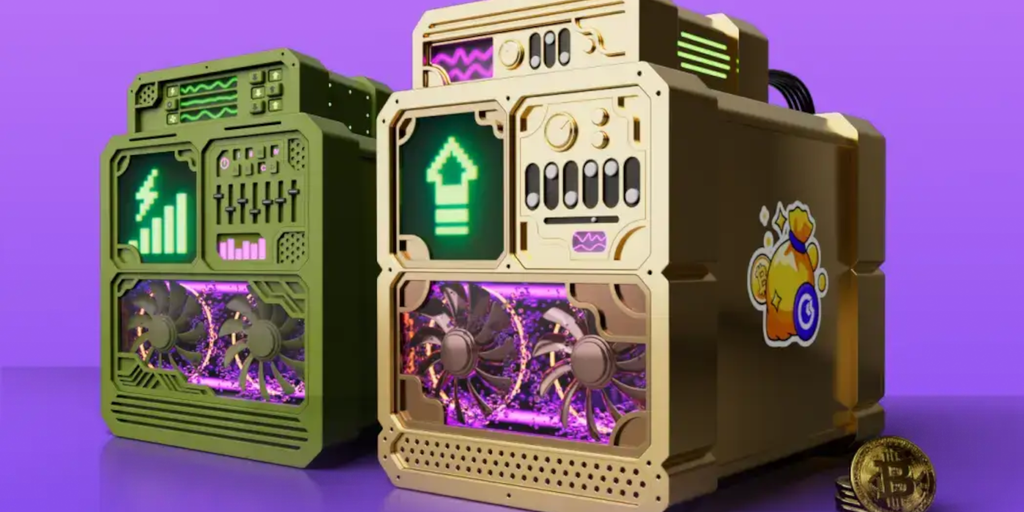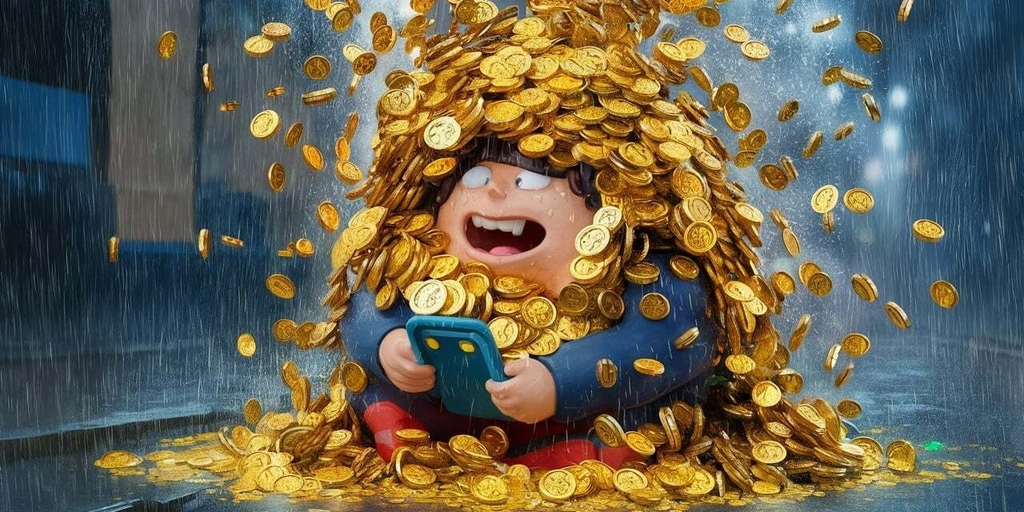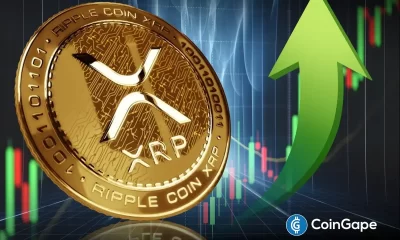gaming
Gaming Tokens Are Disappearing From Crypto’s Top 100—What Happened?
Published
3 weeks agoon
By
admin

There are now zero gaming tokens in the top 100 cryptocurrencies by market capitalization, according to data from CoinGecko, after Immutable (IMX) fell from the rankings on Monday. CoinMarketCap’s ranking still has a few gaming tokens near the bottom of the list, but the takeaway is much the same: Top gaming coins are down bad.
Crypto games have hit prominent peaks over the last year in terms of both mainstream reach and praise from gamers, but the tokens are fading fast and new ones are struggling to catch on.
Just a year ago, there were six gaming tokens in the top 100, according to the Wayback Machine. At the time, CoinGecko’s gaming tokens category had a total market capitalization of $29.3 billion. It’s down 68% to $9.24 billion today, even with more tokens launching since.
Ethereum gaming platform Immutable had been the last holdout, and its token has fallen hard over the last year. IMX was the 31st most valuable cryptocurrency in the world in December 2023, per CoinGecko, after investment firm VanEck gave Immutable a big vote of confidence, projecting that IMX would land in the top 25 tokens in 2024. Even one year ago today, it was ranked #34.
Since then, IMX is down 87% over the last year amid a broader crypto gaming cooldown and SEC investigation that the firm recent said was closed. Immutable’s token has plunged 29% in the last week alone, compared to Bitcoin at a nearly 10% dip, and was the biggest weekly loser in CoinGecko’s top 100 on Monday—until it slid out of view to its current rank of #103.
Other major gaming tokens that were once in the top 100 have also fallen hard in the last year—such as Gala Games (GALA), which is down 80% (19% this week alone), and The Sandbox (SAND), which has fallen 64% in that span (and 16% in seven days).
Those longtime coins have fallen sharply from respective peaks set back in 2021. But even big, recently launched gaming tokens are struggling. Last year’s Pixels (PIXEL) token has plunged 98% from its peak, while Notcoin (NOT) is down 94% and Hamster Kombat (HMSTR) has fallen 68%.
Last week, the GUN token tied to Gunzilla Games’ popular Off the Grid game and its Avalanche L1-based GUNZ network launched, marking the biggest gaming token rollout in months. But it’s already down 62% from the peak price, even before Gunzilla gets GUN integrated into the game.
Better games are here
Off the Grid was Decrypt’s pick for 2024 GG Game of the Year, and after making a big splash last fall, it has helped fuel perceptions that the current crop of crypto games is better than it’s ever been. It’s a big step up from the play-to-earn surge of 2021, driven by the simplistic monster-battling game Axie Infinity.
“In 2021, it was safe to say that it was purely a narrative with zero products, ignoring the top-performing ones like Axie,” pseudonymous Treeverse game founder Loopify told Decrypt. “Now, a few years later, there is actually a wide range of products, but [they] still need time and they haven’t broken into the mainstream.”
Back then, Axie Infinity led the way before its in-game economy, token, and player base took a major hit in early 2022. Now, there’s now a range of quality games, plus games that have drawn millions of players—though popularity and acclaim aren’t always overlapping attributes.
Hamster Kombat drew in 300 million players for the tap-to-earn Telegram game last summer, albeit with repetitive, rudimentary gameplay. Once the token launched in September, players griped about the price and then largely disappeared, while developers were slow to launch a follow-up season.
Off the Grid had one of the most successful public launches for a crypto game in October, becoming the top free title on the Epic Games Store—beating out Fortnite in the process. Farming game Pixels and trading card game Parallel have both drawn praise from players and cultivated growing audiences, while survival experience Crypto: The Game has been a viral, albeit niche hit.
“I actually think the state of gaming is in a solid position,” Jaxie, the pseudonymous community manager for crypto gaming clan GIA, told Decrypt. “We have great games starting to launch, which could onboard millions into the ecosystem.”
But there are misfires
Making a good game takes time—just ask Rockstar Games, which has been developing Grand Theft Auto 6 for seven years with a massive team and funding. This explains why, despite hype for crypto gaming starting years ago, we’re only starting to see the fruits of that labor now.
Equally, that has led to the downfall of crypto games that have attempted to do too much, too soon. The Illuvium franchise is a prime example. Illuvium’s token debuted in 2021 and quickly peaked at $1,749, per CoinGecko. This caused a whirlwind of hype around the project, causing expectations to be sky-high when the team released three interconnected games in July 2024.
However, Illuvium did not live up to expectations, with co-founder Kieran Warwick admitting this February that there were valid “concerns” about its gameplay amid a planned overhaul. The ILV token is down 99.4% from its all-time high to a current price of just $10.60.
“Crypto games 99% of the time just aren’t good,” Munnopoly, a pseudonymous team member behind gaming meme coin MLG, told Decrypt. “They seem to be crypto [tokens] first and games second. I think they have always been struggling to bridge the gap with Web2 gamers.”
One title that appeared poised to bridge that gap was Deadrop. With former Call of Duty and Halo developers and popular streamer Dr. Disrespect involved, mainstream gamers were paying attention as it took shape. However, the studio shut down in January as it ran out of runway following a messy breakup from Dr. Disrespect, amid allegations of inappropriate conversations with a minor.
“I think Deadrop’s cancellation was a major setback for the space,” said content creator MayorReynolds. “It was one of the few games in the space that had the long-term potential to stand on its own as a video game and implement Web3 features in a way that gamers and players could grasp.”
However, gaming projects running out of cash isn’t a rarity. Recently, blockchain gaming ecosystem Treasure announced a major restructuring and downscaling due to financial woes, and Blockworks reported last week that Neon Machine—the creator of shooter Shrapnel—is running out of money.
The makers of Ethereum game The Mystery Society suspended development on the social deduction game in February, with co-creator Chris Heatherly calling out what he saw as destructive behavior from all corners of the blockchain gaming industry.
“Greed and stupidity from just about all players is killing the space before it can prove itself,” Heatherly told Decrypt then. “We need to be focused on building healthy on-chain businesses first, and end this [token generation event]-to-nowhere ponzinomic fallacy. Every Web3 gaming founder I know is frustrated, burned out, and just doing what they are doing to try to survive—but with true conviction evaporating by the day.”
Rethinking the narrative
Part of the issue around gaming tokens lately, according to Loopify, is that investors are gravitating towards crypto assets that are more likely to flip a profit. Since the last major gaming bull run, he noted, the industry has seen waves of investment in meme coins, then social finance, and more recently artificial intelligence.
With each wave of hype that flows to another asset category, less attention is paid to gaming tokens. Such tokens remain volatile in the market, but with much sharper downswings of late.
“The narrative disappeared a while ago, [and] so did a lot of willing buyers since crypto plays [into] trends,” Loopify told Decrypt. “Even if the games were better and at a cheap price for investment in the form of NFTs, tokens, and equity—the market wouldn’t be efficient enough to price them on that straight away. It would take some time for it to reflect.”
Jaxie, however, questions if crypto games even really need a token at all. He believes that gamers only really care about owning their skins via the blockchain, not a game-specific token. Such tokens fuel speculation around projects, but the negative perception around a crashed token can rattle these communities and create impossible expectations.
“Most games shouldn’t run on their own token in the first place,” he said. “Launching a token seems to be more of a marketing tool or crowd pleaser to the current base—don’t get me wrong, I farm those airdrops too—than an actual game utility token.”
The recent wave of tap-to-earn games has seen countless tokens launched to feed each game’s necessary incentive to keep tapping. Ultimately, however, there is very little utility for the tokens post-launch, leading to them plummeting in value. It’s happened over and over again, from Hamster Kombat to Catizen and Zoo, and then some.
Furthermore, the play-to-airdrop trend that swept the industry last year again put tokens in the pockets of players with little incentive to hold onto them. Like the earlier play-to-earn craze that eventually crashed and burned, the initial buzz fueled a surge in interest and sentiment—but the downfall can be painful for projects and players alike.
“Most Web3 gamers are just crypto degens here to make money,” Jaxie said. “Most [crypto] games have a 90-day lifespan before [the] player base drops off significantly—so why build for an economy you know will have a massive population dropoff in three months?”
Edited by Andrew Hayward
GG Newsletter
Get the latest web3 gaming news, hear directly from gaming studios and influencers covering the space, and receive power-ups from our partners.
Source link
You may like


Biological Age vs. Chronological Age: Redefining Age in the Digital Era


TRUMP whale regrets sale, pays double to buy back meme coins


Stripe Tests New Stablecoin Project as $3.7T Market Looms


Falling Wedge Pattern Confirms $264 target


Ethereum community members propose new fee structure for the app layer


Crypto Investors Sue Nike, Accuse Apparel Giant of Rug Pull After Abrupt Closure of Metaverse Business: Report
gaming
This Week in Crypto Games: Ubisoft’s ‘Might & Magic’, ‘Peaky Blinders’ in Development
Published
9 hours agoon
April 27, 2025By
admin

The crypto gaming space is ever expanding, and with prominent games releasing, token airdrops piling up, and the constant shifting of the markets around them all, it’s a lot to take in.
Luckily, we’re all over it here at Decrypt‘s GG. And if you’re looking to keep tabs on the latest happenings around crypto video games, this weekly roundup gives you a quick overview of the biggest stories we covered over the past week, along with a smattering of other interesting tidbits from around the space.
Top stories
Ubisoft’s new crypto game: Ubisoft—the gaming giant behind Assassin’s Creed and Far Cry—is working with blockchain gaming company Immutable to develop Might & Magic: Fates, a free-to-play strategy card game for iOS and Android based on the iconic Might & Magic franchise. Players will collect and trade hundreds of cards featuring creatures and heroes from the series, using faction-specific mechanics to develop personalized strategies. It’s due out later this year.
Immutable operates the Ethereum-based gaming networks Immutable X and Immutable zkEVM, which will be merged together later this year. Ubisoft has been particularly active in the blockchain space, launching two games in late 2024 and making various investments alongside other collaborations. The Immutable alliance was initially announced in November 2023.
Peaky Blinders game: Anonymous Labs and Banijay Rights are developing a blockchain-based video game inspired by the hit TV series “Peaky Blinders,” scheduled for release in 2026. The game will feature post-World War I Birmingham settings, interactive experiences, and tokenized in-game currency.
The crime drama aired on BBC from 2013-2022, starring Cillian Murphy among others, and is available on Netflix. Anonymous Labs previously launched the “Simon’s Cat” meme coin on BNB Chain, based on the web cartoon of the same name. No details about the game’s blockchain network or economic design have been released yet.
CryptoKitties “Meowcoins”: Dapper Labs launched several “Meowcoins” on the Flow blockchain tied to its CryptoKitties: All The Zen game on Telegram. Seeking to avoid the trend of Telegram gaming tokens crashing in value after launch, Dapper’s approach creates an interconnected token ecosystem designed for sustainability.
The system includes three token types: Fancy Coins, Beancoins, and Family Coins. Players earn these through gameplay, with Family Coins representing achievement badges created by burning the other tokens. The ecosystem incorporates crypto-native concepts like prediction markets (the “Rumor Mill”) and future staking opportunities.
Players from previous seasons received airdrops last week. VP Arthur Camara told Decrypt that Dapper’s focus was on creating “a fun experience that is sustainable.”
ICYMI
- KAI: Battle of the Three Kingdoms, an Oasys blockchain game based on licensed Sega IP, is launching on April 30.
- The creators of the upcoming Goblintown: Really Hard Driving Game offered $10K to anyone who could beat the game during an NYC pop-up. Everyone failed.
Key strategic changes in Pixels moving forward…
Focusing on quality DAU rather than DAA
Gating more core game features & earnings behind VIP (requires a purchase) in the short-term
In-game earnings will be further targeted towards people interested in holding or…
— Luke Barwikowski
(@whatslukedoing) April 20, 2025
- GoMining’s Bitcoin mining game, Miner Wars, added new features for beginners and competitive players alike.
- Fantasy.Top, the X influencer-based crypto game, launched a new “clout” system.
- Axie Infinity maker Sky Mavis has invested into Fishing Frenzy studio Uncharted as the mobile fishing game gains steam on Ronin.
Fishing Frenzy is now officially partnered with Sky Mavis!
The creators of Axie Infinity and the @Ronin_Network are backing us with investment, publishing support, and growth advisory to take the game to the next level
What does that mean for you? pic.twitter.com/3DWgfsNGlT
— Fishing Frenzy (@FishingFrenzyCo) April 23, 2025
- A Bored Ape-themed mask in Off the Grid sold for nearly $15K worth of GUN tokens on testnet—a sign that there may be sizable demand for rare items as the game’s mainnet integration nears.
- The creators of the B3 gaming network on Base are handing out Game Boy-like handhelds at the upcoming Token2049 expo in Dubai.
- Nyan Heroes logged 11 million hours in the Solana-based game during its latest playtest, the devs said.
PLAYTEST 4: SIZZLE
11M hours played. 2.2M kills. 250K wishlists.
Global chaos.
Stylish shootouts.
You made it one for the books.
Think it’s over? Think again.
Catch the recap. This is just the start. pic.twitter.com/ur9A7L7lOl
— Nyan Heroes (@nyanheroes) April 23, 2025
- Role-playing game Calamity is migrating across Ethereum scaling networks, from Base to Ronin.
- Neowiz’s Intella X gaming ecosystem is shutting down.
- Clash Royale-like mobile game Ragnarok: Monster World has expanded from Ronin to the new Cross Protocol.
- Playtron said that all 10,000 initial SuiPlay0X1 gaming handhelds have sold out, with shipping set for early summer.
GG Newsletter
Get the latest web3 gaming news, hear directly from gaming studios and influencers covering the space, and receive power-ups from our partners.
Source link
gaming
Bitcoin Mining Game ‘Miner Wars’ Expands With New Features
Published
5 days agoon
April 23, 2025By
admin

In brief
- GoMining added welcome packs and clan leagues to its Miner Wars Bitcoin mining game.
- Players can buy digital miner NFTs on four different blockchains to start playing.
- Miner Wars offers approximately 1 BTC in real crypto rewards daily to players.
GoMining’s Bitcoin mining game Miner Wars bolstered its feature suite on Tuesday with the addition of newcomer-friendly “welcome packs” and a “clan leagues” feature for competitive players, boosting the GameFi experience that’s tied into real-world Bitcoin mining.
Garnering more than 165,000 active players, GoMining says it has paid out more than 144 BTC—or over $13 million in rewards at today’s price—since Miner Wars’ September launch.
“Positioned at the intersection of digital mining and GameFi, Miner Wars has found a welcoming niche with a loyal and stable audience,” said GoMining CEO Mark Zalan in a statement. He said that the fresh features will bring about a “new level of traction and user engagement.”
The time has come! The new Miner Wars Leagues are LIVE
And for the next 7 days, every spell cast in #MinerWars earns bounty points, so you can earn even more $GOMINING
1 spell = 1 bounty point
Stack up to 10,000 points
The bounty is only for 1 WEEK, so don’t… https://t.co/I1tPb7IFLu pic.twitter.com/E2SkneT0Zo
— GoMining (@GoMining_token) April 22, 2025
The game gives individuals access to GoMining’s real Bitcoin mining infrastructure via cross-chain “miner” NFTs, which correspond to a real share of computational resources from the firm’s mining centers. Digital miners have been issued on Solana, Ethereum, BNB Chain, and The Open Network (TON) and can be traded on the GoMining marketplace or third-party platforms like Magic Eden.
Those who purchase miner NFTs essentially join a mining pool, and earn proportional rewards when the pool mines a Bitcoin block. Users can then upgrade their NFTs, potentially improving their chances at winning Bitcoin rewards in the process.
The digital miner NFTs are also used to join Miner Wars, which adds productivity boosts and multipliers while offering higher rewards than the usual compensation from mining. The game hosts around 120-150 rounds per day, offering around 1 Bitcoin in prizes alongside rewards of GOMINING, the company’s Ethereum-based token.
When joining the game, users commit the computational power of their miner NFTs—which is denominated in terahashes—to compete against other players, joining clans, or groups of other players in the process.
As of today’s updates, those clans are now being grouped into leagues to increase competitiveness with weekly promotions and demotions based on performance. Clans may be placed in lower-level leagues like the Dune League, which is designed for newer players, or pushed up to the Odyssey League—which offers bigger prizes, but is intended for more experienced and “elite” Miner Wars players.
The firm is also adding welcome packs that come with free boosts to help users “become familiar with the UI and mechanics of Miner Wars,” GoMining Content Marketing Manager Laila Effiong told Decrypt.
While mining, or the process of securing and verifying blocks on Bitcoin’s proof-of-work (PoW) blockchain, is a technically complex and energy-intensive process, GoMining aims to simplify it and educate more crypto users. The firm claims more than 3.5 million users worldwide, with its data centers boasting 7.5 million terahashes of computational power.
“Mining is complex, and we can’t understate that,” said Effiong, noting the difficulty of maintaining the efficiency of GoMining’s global mining operations. “But for the GoMining end users, they don’t need to feel any of that burden.”
Edited by Andrew Hayward
GG Newsletter
Get the latest web3 gaming news, hear directly from gaming studios and influencers covering the space, and receive power-ups from our partners.
Source link
gaming
This Week in Crypto Games: Solana Game Pass, ‘Ponzi’ Games Pop, SEC and CyberKongz
Published
7 days agoon
April 21, 2025By
admin

The crypto gaming space is ever expanding, and with prominent games releasing, token airdrops piling up, and the constant shifting of the markets around them all, it’s a lot to take in.
Luckily, we’re all over it here at Decrypt‘s GG. And if you’re looking to keep tabs on the latest happenings around crypto video games, this weekly roundup gives you a quick overview of the biggest stories we covered over the past week, along with a smattering of other interesting tidbits from around the space.
Top stories
Solana Game Pass: A free Solana Game Pass NFT mint launched on Magic Eden last week, designed to help boost the Solana gaming ecosystem via rewards, collaborations, and early access to upcoming games. The program’s initial “Season 0” spans four weeks with 30 partnered games, including Star Atlas, Nyan Heroes, Stepn, and BR1: Infinite.
Pass holders can complete quests on GAM3S.GG to win raffle tickets toward a $10,000+ prize pool of SOL, NFTs, and other assets. Over 33,000 passes have been minted as of this writing, with the mint remaining open throughout the four-week campaign. Future seasons promise enhanced features including in-game quests and an improved progression system.
“Ponzi” games pop: Crypto game Bigcoin recently surged in popularity before its token crashed 83%, creating a surprising reaction: players embraced its purported “Ponzinomics” and actively sought similar experiences. Bigcoin’s simple mining simulation lets players earn BIG tokens on Ethereum‘s Abstract network, with transparent reward calculations that many found refreshing compared to vague and oft-disappointing play-to-airdrop models.
The phenomenon appeared to attract crypto traders beyond typical gamers, with some seeing these self-described “Ponzi games” as more transparent alternatives to insider-dominated projects. Since BIG crashed, similar games like Minereum and Dungeons of Fortune have briefly gained attention… with similar results.
SEC drops CyberKongz case: The SEC has concluded its investigation into Ethereum NFT and gaming project CyberKongz without findings or enforcement, the project’s team said last week, adding to the list of numerous recent closed crypto investigations under the Trump administration. CyberKongz had received a Wells notice in December after two years of SEC scrutiny regarding its BANANA token, game elements, and Genesis Kongz contract migration.
Project leaders celebrated the decision as a victory after facing “unjust allegations” and “crippling legal fees,” noting that they “elected to fight this battle for the betterment of Web3.” CyberKongz joins other NFT-related companies like Bored Ape Yacht Club creator Yuga Labs and marketplace OpenSea that recently saw their SEC investigations closed.
ICYMI
Introducing Meowcoins!
Start playing CryptoKitties: ALL THE ZEN! and hatch Page’s Gang Kitties in the next few days, earn Meowcoins—and get a head start for next season!
Link to play below
This is the start of the Eggdrop. Buckle up.
pic.twitter.com/nzBigzvYJj
— CryptoKitties (@CryptoKitties) April 14, 2025
We’ve breached containment on a hazardous new Battle Pass packed with experimental drip. The ChemTech is unleashing pure, undiluted mayhem on Teardrop!
ChemTech Character Gear
Proton Drifter weapon
Flenser ChemTech weapon
“Fire and Flex” Emote
“I’m Fine” M4 weapon… pic.twitter.com/9yexEyD7EB
— Off The Grid (@playoffthegrid) April 17, 2025
GG spotlight
Here are a few of our original stories from this past week that we think are well worth a weekend read:
GG Newsletter
Get the latest web3 gaming news, hear directly from gaming studios and influencers covering the space, and receive power-ups from our partners.
Source link

Biological Age vs. Chronological Age: Redefining Age in the Digital Era

TRUMP whale regrets sale, pays double to buy back meme coins

Stripe Tests New Stablecoin Project as $3.7T Market Looms

Falling Wedge Pattern Confirms $264 target
Dogecoin Confirms Daily Trend Reversal With Breakout, Retest, And New Uptrend

Ethereum community members propose new fee structure for the app layer

Crypto Investors Sue Nike, Accuse Apparel Giant of Rug Pull After Abrupt Closure of Metaverse Business: Report

Top cryptocurrencies to watch: Pi Network, XRP, Sui

This Week in Crypto Games: Ubisoft’s ‘Might & Magic’, ‘Peaky Blinders’ in Development

Why Arbitrum-Nvidia Partnership Collapsed – And What It Means for Web3

Tariff Carnage Starting to Fulfill BTC’s ‘Store of Value’ Promise

The cost of innovation — Regulations are Web3’s greatest asset

Best Crypto to Buy as Derivatives Exchange CME Set to Launch XRP Futures

Metaplanet Buys Additional ¥1.92 Billion Worth Of Bitcoin

Here Are Four Signs the Stock Market Has Bottomed, According to Fundstrat’s Tom Lee

Arthur Hayes, Murad’s Prediction For Meme Coins, AI & DeFi Coins For 2025

Expert Sees Bitcoin Dipping To $50K While Bullish Signs Persist

3 Voting Polls Show Why Ripple’s XRP Price Could Hit $10 Soon

Aptos Leverages Chainlink To Enhance Scalability and Data Access

Bitcoin Could Rally to $80,000 on the Eve of US Elections

Crypto’s Big Trump Gamble Is Risky

Institutional Investors Go All In on Crypto as 57% Plan to Boost Allocations as Bull Run Heats Up, Sygnum Survey Reveals

The Future of Bitcoin: Scaling, Institutional Adoption, and Strategic Reserves with Rich Rines

Sonic Now ‘Golden Standard’ of Layer-2s After Scaling Transactions to 16,000+ per Second, Says Andre Cronje

Ripple-SEC Case Ends, But These 3 Rivals Could Jump 500x

Has The Bitcoin Price Already Peaked?

A16z-backed Espresso announces mainnet launch of core product

Xmas Altcoin Rally Insights by BNM Agent I

Blockchain groups challenge new broker reporting rule

I’m Grateful for Trump’s Embrace of Bitcoin
Trending

 24/7 Cryptocurrency News6 months ago
24/7 Cryptocurrency News6 months agoArthur Hayes, Murad’s Prediction For Meme Coins, AI & DeFi Coins For 2025

 Bitcoin3 months ago
Bitcoin3 months agoExpert Sees Bitcoin Dipping To $50K While Bullish Signs Persist

 Ripple Price1 month ago
Ripple Price1 month ago3 Voting Polls Show Why Ripple’s XRP Price Could Hit $10 Soon

 24/7 Cryptocurrency News4 months ago
24/7 Cryptocurrency News4 months agoAptos Leverages Chainlink To Enhance Scalability and Data Access

 Bitcoin6 months ago
Bitcoin6 months agoBitcoin Could Rally to $80,000 on the Eve of US Elections

 Opinion6 months ago
Opinion6 months agoCrypto’s Big Trump Gamble Is Risky

 Bitcoin5 months ago
Bitcoin5 months agoInstitutional Investors Go All In on Crypto as 57% Plan to Boost Allocations as Bull Run Heats Up, Sygnum Survey Reveals

 Bitcoin3 months ago
Bitcoin3 months agoThe Future of Bitcoin: Scaling, Institutional Adoption, and Strategic Reserves with Rich Rines








